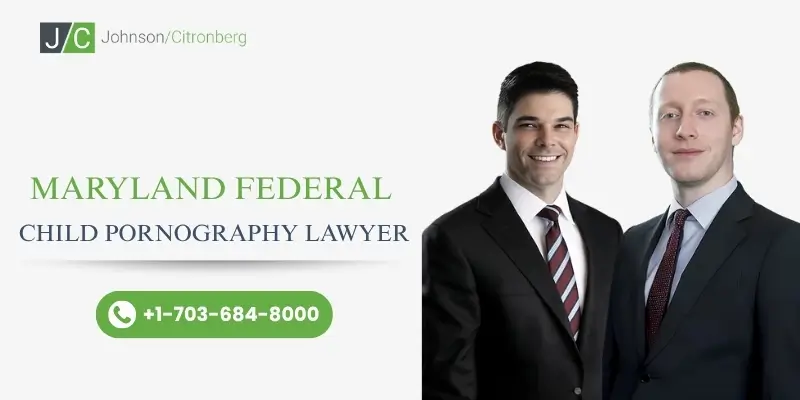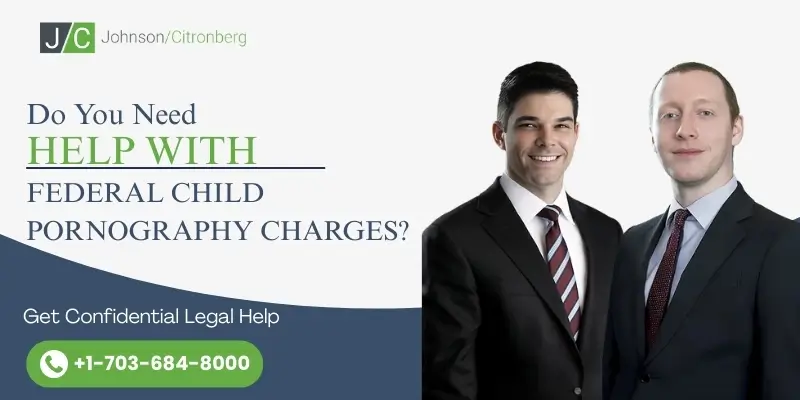Maryland Federal Child Pornography Lawyer
Federal Child Pornography Attorney in Maryland
In Maryland, being the subject of a child pornography investigation or charge is terrifying and overwhelming. The federal child pornography penalties can change your life’s trajectory, and federal prosecutors handle these cases with the utmost seriousness. The ideal course of action if you are suspected is to get in touch with a knowledgeable Maryland federal child pornography lawyer right away. especially to understand what to do during a federal investigation and protect your rights from day one. They know how these cases operate and can help you defend your future.

About Johnson/Citronberg
At Johnson/Citronberg, we focus almost exclusively on state and federal criminal defense. Based in Alexandria, Virginia, and Atlanta, Georgia, we have litigated cases throughout the country, including in the U.S. District Court for the District of Maryland.
Our lawyers have been honored by Super Lawyers, the Washington Post, and other prestigious organizations for their excellence in criminal litigation. Our clients benefit from our innovative defense tactics, and we maintain an absolute dedication to defending their rights.
Understanding Federal Child Pornography Laws
Federal child pornography charges in Maryland are charged under federal laws, such as 18 U.S.C. §§ 2251, 2252, and 2252A. The legislation bans all activities, including producing and possessing explicit pictures of minors. Internet crimes are considered crimes against interstate commerce, and as a result, almost all internet-based cases are federal. It’s critical to understand how the federal court process for child-pornography charges unfolds so you can make informed decisions at each step.
As such, an investigation by the state police in Maryland can become a federal prosecution by the FBI, Homeland Security, or other federal agencies. Defendants found guilty of receiving child pornography received an average sentence of 101 months. Eighty-seven percent of convicted defendants with five-year mandatory minimum offenses received an average sentence of 87 months.
Federal cases are extremely difficult because the sentencing guidelines are rigid, mandatory minimums apply, and punishments reach far beyond prison sentences. People convicted of sex offenses face registration requirements and employment limitations while under supervised release that extend across many decades. The first step in building a defense is understanding the reach of these laws.
Distributing Child Pornography
Distribution does not necessarily have to be through sale or even actual mailing of illegal content. Distribution under federal law is defined much more broadly. Exchanging files on peer-to-peer networks, sending images via email or a messaging service, or uploading them for access via the cloud can all be defined as distribution.
For example, a Maryland resident who makes files accessible on a shared drive could face federal distribution charges regardless of whether payment was requested. If the intent to share is there, it can be considered distribution, even if the content is only downloaded by a single individual.
Possessing Child Pornography
Possession of child pornography is another charge that is common in Maryland federal cases. It is a crime to knowingly possess illegal images or videos on any device. This can be in a computer, a phone, or an external drive, but possession does not require distribution. The images or videos could have been on your computer, and you never shared or created them.
This makes possession charges particularly complex, especially if multiple people have access to the same device. In some instances, files may be automatically downloaded to a device without the recipient’s knowledge. While the prosecution bears the burden of proof, a Maryland federal child pornography attorney can look at the facts of your case and build an appropriate defense.
Receiving Child Pornography
Receiving child pornography is also a federal crime, separate from distribution and possession. The distinction of receiving is that the prosecutor does not have to show you had it for any length of time, just that you obtained it. The action of clicking a download link or opening an email attachment may be sufficient for them to charge you.
Hire a Federal Child Pornography Lawyer
Federal child pornography cases are some of the most complicated criminal cases. The right lawyer is someone who knows how digital evidence and federal sentencing work. An attorney skilled in such cases can contest a search’s validity and the forensic procedures while aiming to reduce charges or pursue sentencing alternatives.
Your Maryland attorney can support you throughout every step of the process while defending your legal rights. Hire a federal child pornography lawyer today.
FAQs
What Is the Child Online Protection Act of 2025?
The Child Online Protection Act of 2025 is a proposed bill. The law would expand existing safeguards for children, restricting their exposure to dangerous online content. It would also tighten privacy protections for children and enhance penalties for online exploitation.
The bill addresses modern challenges that did not exist in previous laws, such as social media, streaming services, and AI platforms. It aims to balance the need for child safety with existing First Amendment free speech protections.
What Is Considered an Illegal Recording in Maryland?
Illegal recording refers to recordings that violate a person’s privacy. This includes recording a person in a private bathroom, changing room, locker room, private residence, or illegally tapping their phone lines without their permission. The same recordings can lead to more serious criminal charges if they are employed for harassment or to exploit or share obscene materials.
What Is the New Obscenity Law?
The new obscenity law can refer to several legal changes to earlier laws that have updated or further clarified restrictions on various obscene materials. These changes often follow technological developments and include changes to what is considered legally obscene material. Obscene material is determined by the Miller Test. An experienced lawyer can help you better understand these new laws.
What Is Not Protected by the First Amendment in Maryland?
The right to free speech in the First Amendment has exceptions. Obscenity, child pornography, threats, inciting lawlessness, and defamation do not have constitutional protection. Essentially, if the speech is likely to cause harm to another or exhibits clear signs of danger, such as threatening to kill someone, this is not protected by the First Amendment.
Contact Johnson/Citronberg
Being accused of federal child pornography is a serious matter. Even if you are never convicted, the mere accusations can come with serious repercussions to your personal and professional life. Johnson/Citronberg can help you fight for your rights and your future and build an appropriate defense on your behalf. We can defend you in court. Contact us today for more information.



